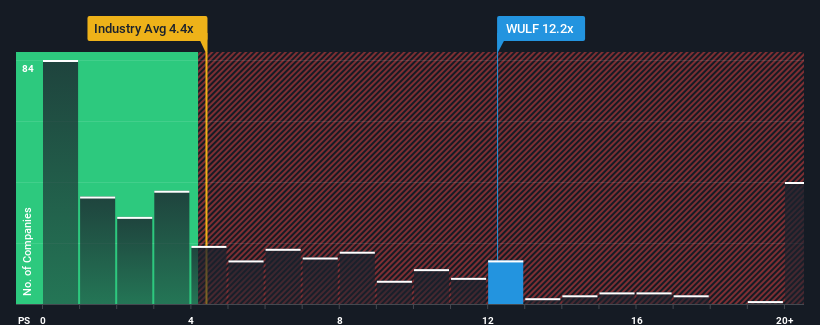- United States
- /
- Software
- /
- NasdaqCM:WULF
TeraWulf Inc. (NASDAQ:WULF) Stocks Pounded By 30% But Not Lagging Industry On Growth Or Pricing
The TeraWulf Inc. (NASDAQ:WULF) share price has softened a substantial 30% over the previous 30 days, handing back much of the gains the stock has made lately. Still, a bad month hasn't completely ruined the past year with the stock gaining 40%, which is great even in a bull market.
Even after such a large drop in price, TeraWulf's price-to-sales (or "P/S") ratio of 12.2x might still make it look like a strong sell right now compared to other companies in the Software industry in the United States, where around half of the companies have P/S ratios below 4.4x and even P/S below 1.6x are quite common. However, the P/S might be quite high for a reason and it requires further investigation to determine if it's justified.
View our latest analysis for TeraWulf

How Has TeraWulf Performed Recently?
TeraWulf certainly has been doing a good job lately as it's been growing revenue more than most other companies. It seems the market expects this form will continue into the future, hence the elevated P/S ratio. If not, then existing shareholders might be a little nervous about the viability of the share price.
Keen to find out how analysts think TeraWulf's future stacks up against the industry? In that case, our free report is a great place to start.Is There Enough Revenue Growth Forecasted For TeraWulf?
There's an inherent assumption that a company should far outperform the industry for P/S ratios like TeraWulf's to be considered reasonable.
Retrospectively, the last year delivered an explosive gain to the company's top line. Although, its longer-term performance hasn't been anywhere near as strong with three-year revenue growth being relatively non-existent overall. Therefore, it's fair to say that revenue growth has been inconsistent recently for the company.
Turning to the outlook, the next year should generate growth of 89% as estimated by the five analysts watching the company. Meanwhile, the rest of the industry is forecast to only expand by 14%, which is noticeably less attractive.
With this in mind, it's not hard to understand why TeraWulf's P/S is high relative to its industry peers. Apparently shareholders aren't keen to offload something that is potentially eyeing a more prosperous future.
What Does TeraWulf's P/S Mean For Investors?
Even after such a strong price drop, TeraWulf's P/S still exceeds the industry median significantly. While the price-to-sales ratio shouldn't be the defining factor in whether you buy a stock or not, it's quite a capable barometer of revenue expectations.
We've established that TeraWulf maintains its high P/S on the strength of its forecasted revenue growth being higher than the the rest of the Software industry, as expected. It appears that shareholders are confident in the company's future revenues, which is propping up the P/S. Unless the analysts have really missed the mark, these strong revenue forecasts should keep the share price buoyant.
We don't want to rain on the parade too much, but we did also find 4 warning signs for TeraWulf (3 are concerning!) that you need to be mindful of.
It's important to make sure you look for a great company, not just the first idea you come across. So if growing profitability aligns with your idea of a great company, take a peek at this free list of interesting companies with strong recent earnings growth (and a low P/E).
Valuation is complex, but we're here to simplify it.
Discover if TeraWulf might be undervalued or overvalued with our detailed analysis, featuring fair value estimates, potential risks, dividends, insider trades, and its financial condition.
Access Free AnalysisHave feedback on this article? Concerned about the content? Get in touch with us directly. Alternatively, email editorial-team (at) simplywallst.com.
This article by Simply Wall St is general in nature. We provide commentary based on historical data and analyst forecasts only using an unbiased methodology and our articles are not intended to be financial advice. It does not constitute a recommendation to buy or sell any stock, and does not take account of your objectives, or your financial situation. We aim to bring you long-term focused analysis driven by fundamental data. Note that our analysis may not factor in the latest price-sensitive company announcements or qualitative material. Simply Wall St has no position in any stocks mentioned.
Have feedback on this article? Concerned about the content? Get in touch with us directly. Alternatively, email editorial-team@simplywallst.com
About NasdaqCM:WULF
TeraWulf
Operates as a digital asset technology company in the United States.
High growth potential with low risk.
Similar Companies
Market Insights
Community Narratives



